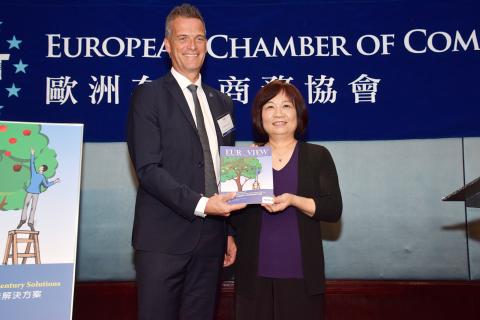The European Chamber of Commerce Taiwan (ECCT) yesterday called on the government to align the nation’s regulatory system with international standards and facilitate making English a second official language.
“The government has made progress toward improving Taiwan’s regulatory environment, but it is not fully optimized yet to meet the needs of a modern economy,” ECCT chairman Hakan Cervell told a media briefing on the release of the chamber’s annual position paper.
Some local practices still deviate from international standards and make doing business in Taiwan difficult, Cervell said.

Photo courtesy of the National Development Council
It is unreasonable for local safety regulations to demand duplicate testing and paperwork for complete vehicles and components that have already been certified in Europe, the paper said.
Taiwan should also allow certified electronic signatures, because producing international certificates to present to authorities is time-consuming and costly, it said.
In line with the government’s move toward digitization, procedures should be able to be done online, the paper said.
The chamber welcomed the government’s efforts to establish English as a second official language by 2030, saying that improving English-language proficiency would help move Taiwan up the value chain.
The Executive Yuan is to draw up an action plan regarding this by the end of the year.
The trade group said it recommended setting up a central translation resource center to ensure consistency in translations across all ministries, adding that a coordinated effort is needed to translate all legislation and make government Web sites bilingual.
The chamber has over the years pushed for street names to be consistently spelled by different governments.
Raising the level of English proficiency would take time, the trade group said.
The Ministry of Education has already made proposals to that end, such as increasing English class hours at elementary, junior and senior-high schools, and establishing bilingual classes.
The measures focus on making the next generation fluent in English, but progress should also be made with ongoing adult education, the chamber said.
“A good place to start is to improve the level of English fluency of government officials at all levels, through training and by offering incentives,” it said.
The chamber said it was grateful that the National Development Council and the Ministry of the Interior have decided to change the number formats on Alien Resident Certificates and Alien Permanent Resident Certificates, as the lack of compatibility with Taiwanese citizens’ identification numbers has denied foreign residents access to online shopping and other commercial services.

Taiwanese actress Barbie Hsu (徐熙媛) has died of pneumonia at the age of 48 while on a trip to Japan, where she contracted influenza during the Lunar New Year holiday, her sister confirmed today through an agent. "Our whole family came to Japan for a trip, and my dearest and most kindhearted sister Barbie Hsu died of influenza-induced pneumonia and unfortunately left us," Hsu's sister and talk show hostess Dee Hsu (徐熙娣) said. "I was grateful to be her sister in this life and that we got to care for and spend time with each other. I will always be grateful to

REMINDER: Of the 6.78 million doses of flu vaccine Taiwan purchased for this flu season, about 200,000 are still available, an official said, following Big S’ death As news broke of the death of Taiwanese actress and singer Barbie Hsu (徐熙媛), also known as Big S (大S), from severe flu complications, the Centers for Disease Control (CDC) and doctors yesterday urged people at high risk to get vaccinated and be alert to signs of severe illness. Hsu’s family yesterday confirmed that the actress died on a family holiday in Japan due to pneumonia during the Lunar New Year holiday. CDC Deputy Director-General Tseng Shu-hui (曾淑慧) told an impromptu news conference that hospital visits for flu-like illnesses from Jan. 19 to Jan. 25 reached 162,352 — the highest

TAIWAN DEFENSE: The initiative would involve integrating various systems in a fast-paced manner through the use of common software to obstruct a Chinese invasion The first tranche of the US Navy’s “Replicator” initiative aimed at obstructing a Chinese invasion of Taiwan would be ready by August, a US Naval Institute (USNI) News report on Tuesday said. The initiative is part of a larger defense strategy for Taiwan, and would involve launching thousands of uncrewed submarines, surface vessels and aerial vehicles around Taiwan to buy the nation and its partners time to assemble a response. The plan was first made public by the Washington Post in June last year, when it cited comments by US Indo-Pacific Commander Admiral Samuel Paparo on the sidelines of the Shangri-La Dialogue

Suspected Chinese spies posing as Taiwanese tourists have been arrested for allegedly taking photographs of Philippine Coast Guard ships, local media reported. The suspected spies stayed at a resort in Palawan, where from a secluded location they used their phones to record coast guard ships entering and leaving a base, Philippine TV network GMA said on Wednesday. Palawan is near the Spratly Islands (Nansha Islands, 南沙群島) and other disputed areas of the South China Sea, where tensions have been on the rise between China and the Philippines. The suspects allegedly also used drones without permission and installed cameras on coconut trees in the